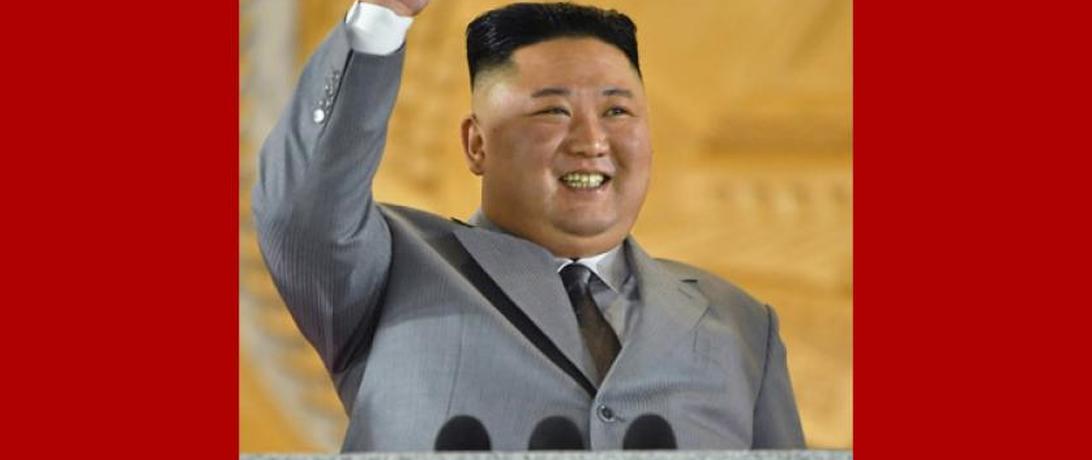
Kim Jong Un at the 75th anniversary of the foundation of the WPK. Source: KCNA
* The article was originally published on ONN's Datayo platform.
Overview and Context of the 2020 Speech
2020 marks the year when the DPRK celebrates the 75th anniversary of the foundation of the WPK. This jubilee year coincided with the global COVID-19 pandemic and associated border closings, a decline in the DPRK economy due to sanctions and torrential floods and typhoons in the late summer. During the parade held as part of the celebration of the anniversary, Kim Jong Un addressed the audience in a particularly emotional speech.
In an almost half-hour long speech, Kim expressed his gratitude to the North Korean people for their trust in and support for the Party, and for their trust in him personally especially during the challenging times of 2020. He cited the economic damage from the COVID-19 pandemic and the natural disasters as the main challenges the country faced this year. He also thanked the people for staying well and healthy, suggesting that not a single citizen of the DPRK had contracted COVID-19. The atmosphere around the parade was meant to support this claim, as neither the general public nor the military and the top officials were wearing face masks.
He also touched upon military issues, though comparatively briefly. The general tone of his message appeared to be domestic facing, addressing the state of internal affairs rather than global affairs. Comparing the 2020 speech with the speech Kim gave on the occasion of the 70th anniversary of the WPK in 2015, a change of tone can be observed. It shifted from Party-focused to a more people-oriented messaging, with Kim separating himself from the rest of the Party and taking personal responsibility for the hardships the North Korean people have had to endure. There was also a change in how he referred to the DPRK's adversaries. In 2015, he mentioned "US imperialists" three times, while in 2020 he only made two general mentions of "hostile forces", without referring to the United States at all. [1]
Analysis of Kim's overall public activities in 2020 do not show major deviations from his activities in 2019, with the notable exception of activities related to the economy and natural disasters. Taken together, however, the economy and natural disaster-related activities in 2020 combined correspond to the same percentage of economy-related activities in the disaster-free year of 2019 (see Figure 1). Taking that into account, it is not surprising that a substantial part of his address was devoted to reconstruction measures and expressions of gratitude to the people involved, in particular those from the Korean People's Army (KPA).
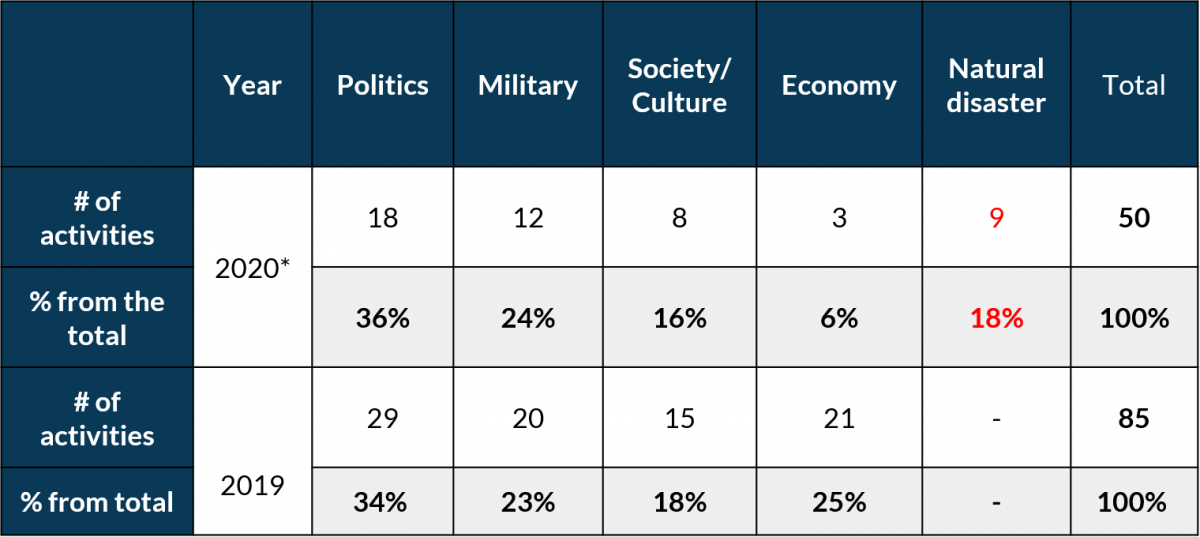
*As of 23 October 2020 Source: KCNA, Rodong Sinmun
Figure 1. Kim Jong Un's public activities in 2019 and 2020
The parade was held at its traditional venue in Pyongyang at Kim Il Sung square, but the timing was unique. According to the clock that was shown during the broadcasted recording and the official Korean Central News Agency (KCNA) report [2], the event started at midnight on 10 October. This corresponds with South Korean military estimates of timing of the event. [3] There is no unified opinion among analysts on why the night time was chosen.
The parade was not broadcast live and KCTV only released recorded and edited footage of the event at 7:00 PM Pyongyang time on 10 October. None of the attendees were seen to be wearing face masks as COVID-19 precaution measures.
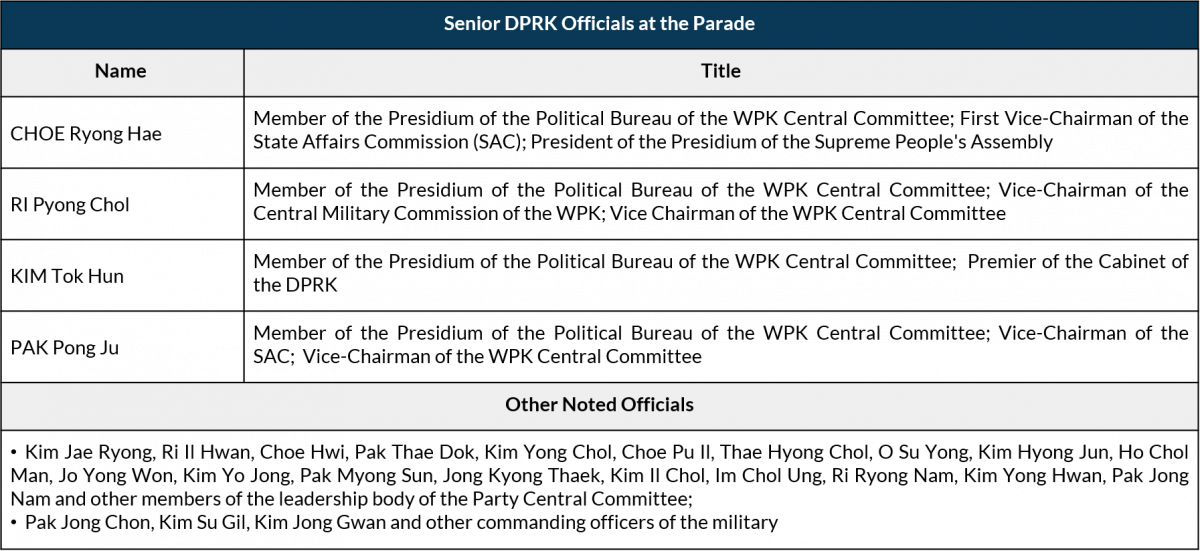
Figure 2. Leadership presence according to the official KCNA report. Source: KCNA [4]
In contrast to the celebration on the occasion of the 70th anniversary, no Chinese envoy was present. This is likely due to COVID-19 related precautions. The leadership presence reflects recent personnel reorganization in particular during the 16th meeting of the 7th WPK Central Committee's Political Bureau on 13 August 2020. [5] Also noteworthy was the immediate presence next to Kim Jong Un of Ri Pyong Chol and Pak Jong Chon. Both were promoted to the rank of Marshall of the KPA on 5 October 2020, just days prior to the anniversary celebration. [6] They are considered to be key military advisers and involved in the development of the country's strategic weapons.
Speech Analysis
Examining how this year's speech compares both with past speeches given by Kim Jong Un and the news output of KCNA can show some general linguistic patterns. One way to do so quantitatively is to examine sentiment and subjectivity of a particular corpus. Whereas sentiment analysis aims at determining the degree to which a text is a positive or negative expression of opinion, subjectivity analysis aims at determining to what degree a text is factual or an expression of opinion. [7]
Quantitatively, Kim Jong Un's speeches have been more positive on average in sentiment than that of the corpus of KCNA. The graph in Figure 3 also shows that the year of 2020 has so far consisted of speeches that on average score third highest in terms of positivity since Kim Jong Un has assumed leadership. Only 2012 and 2018 have a higher average sentiment score for Kim's speeches in comparison.

Figure 3. Average yearly sentiment comparison between KJU speeches and KCNA output. Source: KCNA via ONN's Datayo.org, Foreign Languages Publishing House
When looking at only his speeches, quantitatively, there is no clear indication that this latest speech stands out from the rest. The October 2020 speech recorded a positive sentiment score of 0.23. This is about 0.05 points higher than the average speech sentiment of 0.18. This sentiment score places it firmly in an average position with a total range from a low of -0.008 (9/22/2017) to a high of 0.33 (6/6/2012). These data suggest that at least in terms of sentiment, the October 2020 speech does not stand out from Kim Jong Un's recent speeches.
It does, however, stand out in terms of subjectivity. When text is more subjective, it suggests a more emotive and belief driven structure as opposed to objective fact and statement making. The October speech recorded a subjectivity score of 0.577, the highest subjectivity score for any Kim Jong Un speech since 2012. This is in line with the general observation that the tone of his voice was uniquely emotive in nature and that he even appeared to tear up as he spoke.
Moving beyond sentiment and subjectivity, we can further examine how this speech compares with past speeches by examining notable keywords from the speech.
In the latest speech, Kim mentioned three main factors that affected the economic situation of the country, namely the COVID-19 pandemic (and as a consequence closed borders and a halt on transborder trade), natural disasters (typhoons and floods that hit the DPRK in the summer) and international sanctions. He focused primarily on the pandemic and the floods; he mentioned sanctions only once, without placing a strong emphasis on them. Examining all his known public speeches, 36 in total, the topic of sanctions has been present in all of his publicly known speeches starting from 2012, reaching its peak frequency in 2019 and the first half of 2020 (see Figure 4). The fact that the situation in the country in 2020 was highly affected by other external factors (pandemics and floods) pushed the sanctions theme to the back as a less important factor.
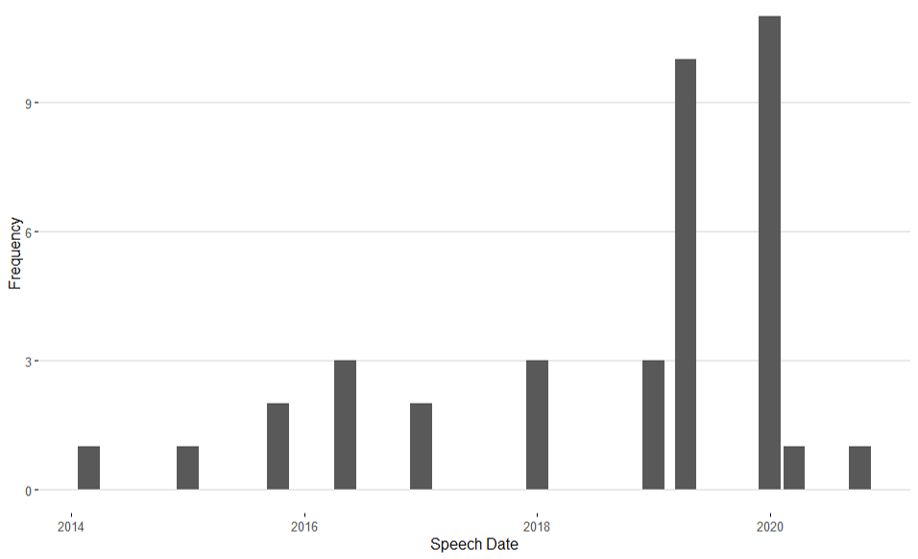
Figure 4. Frequency of references to "sanctions" in Kim Jong Un's speeches. Source: KCNA, Foreign Languages Publishing House
With a strong emphasis on the people of the DPRK and the state of its economy, external messaging was rather restrained in this speech. Though he mentioned "hostile forces" twice, he did so without explicit reference to either the United States or the Republic of Korea (ROK). References to "hostile policy" or "hostile forces" are common and can be found in 44% of his known public speeches (see Figure 5). However, when mentioned in a speech, explicit reference to the United States or the ROK can usually also be found in the text, even if at a different location within the speech. Notable about his three most recent speeches this year, including the latest one on the occasion of the 75th anniversary, has been that he refrained from such an explicit reference. It remains to be seen if this develops into a trend, but it suggests restrained explicit messaging on the external front by Kim Jong Un himself.
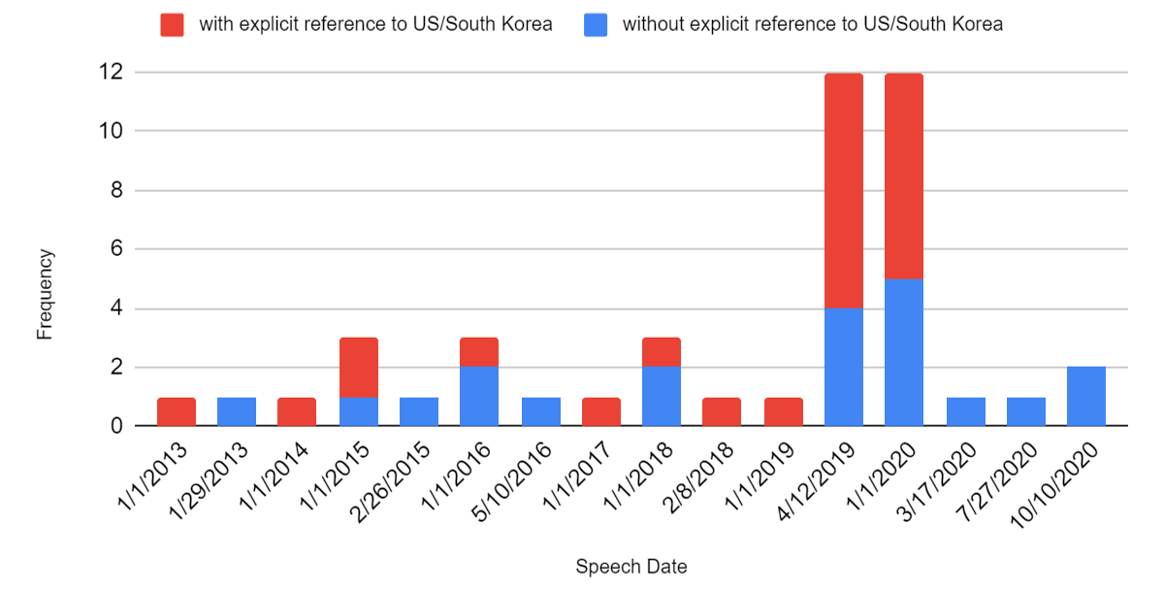
Figure 5. Frequency of references to "hostile policy" and/or "hostile forces" in Kim Jong Un's speeches. Source: KCNA, Foreign Languages Publishing House
Also notable were the "warm wishes" expressed towards the South Korean people in the beginning of the speech. He expressed hope that "this health crisis would come to an end as early as possible" and that "the day would come when the north and south take each other's hand again." [8] Across all known public speeches, references to South Korea in a solely positive sentiment are rare. A notable recent example includes his 2019 New Year's Address, when he favourably reviewed developments in 2018 on inter-Korean engagement initiatives (see Figure 6).
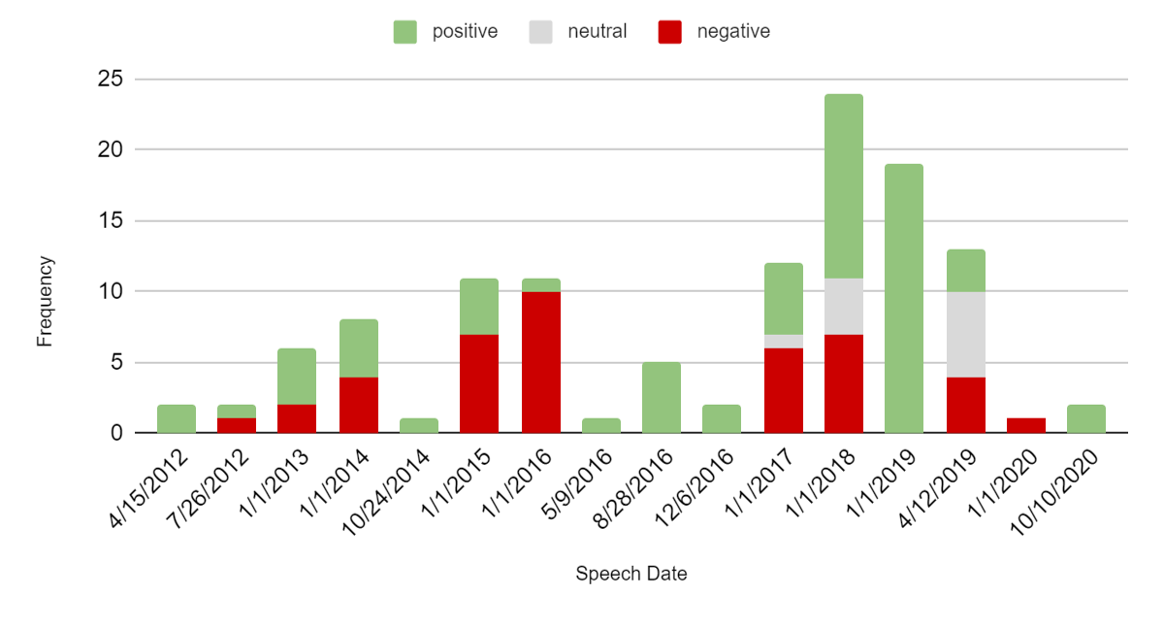
Figure 6. Frequency of explicit references to South Korea in Kim Jong Un's speeches. Source: KCNA, Foreign Languages Publishing House
A positive reference with explicit linkage to overcoming the COVID-19 pandemic is, however, in line with what has been reported on inter-Korean exchanges of letters between the two leaders. On 5 March 2020, the Blue House reported on a letter sent by Kim Jong Un on the previous day to express his support for the South Korean people fighting the virus and his belief that it will be overcome. In a directly cited quotation, he is also reported to have written that he "wishes that the precious health of the South Korean compatriots will be kept." [9] Similarly, the Blue House revealed an exchange of letters in September 2020 with the full text of both letters fully disclosed. In response to a letter by President Moon Jae-in dated 8 September 2020, Kim wrote on 12 September that he "once again sincerely wishes that the South Korean compatriots' precious health and happiness will be kept" and that he "firmly believes inwardly that you [President Moon Jae-in] will overcome this crisis with your extraordinary sincerity, strong will and ability for your country and people." [10]
While in contrast with a downward trend in inter-Korean relations following, in particular, the harsh language about anti-DPRK leaflets directed towards South Korean authorities by Kim Yo Jong in June 2020 [11], the destruction of the inter-Korean liaison office in Kaesong on 16 June 2020 and the killing of a South Korean official in DPRK waters on 22 September 2020, Kim Jong Un has been consistent in his positive expressions of solidarity with regards to the COVID-19 pandemic. This speech, however, marks the first time he appears to have done so publicly.
On military issues, Kim Jong Un highlighted both developmental progress and clearly visible achievements in comparison with the military parade on the occasion of the 70th anniversary, while insisting that the country's military capabilities exist for self-defence and deterrence purposes only. Notable in the 2020 speech is that "nuclear" was mentioned only once, in reference to the nuclear threat posed by outside forces. While the word "nuclear" features frequently across all his speeches, it typically occurs in conjunction with explicit references to the country's own nuclear forces vis-à-vis those held by others (see Figure 7).
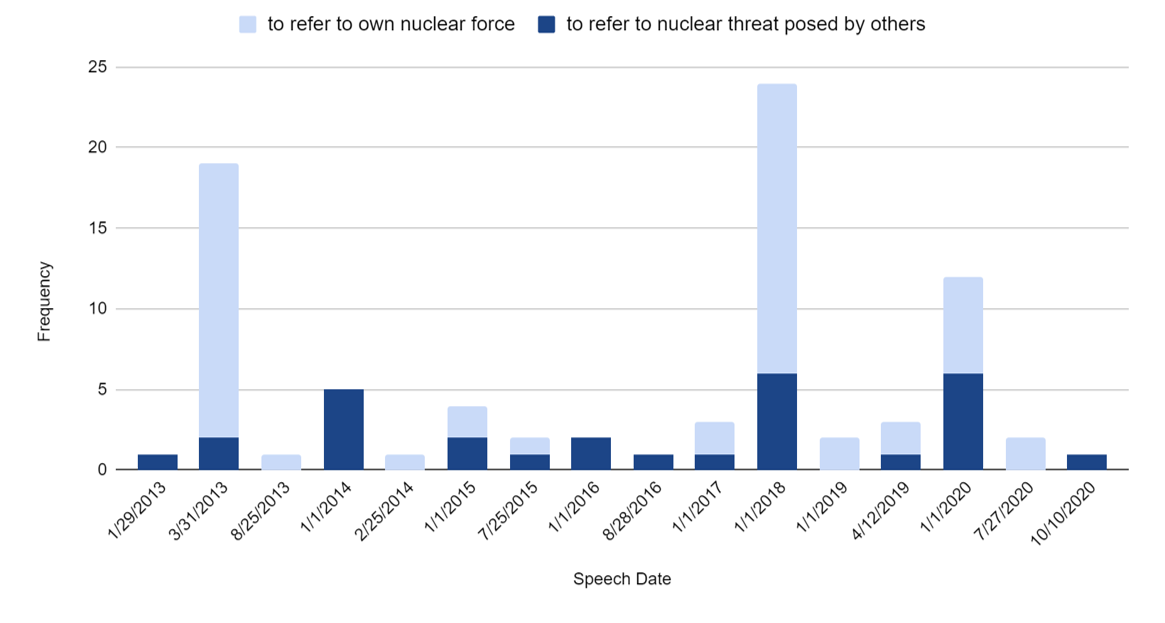
Figure 7. Frequency of references to "nuclear" in Kim Jong Un's speeches. Source: KCNA, Foreign Languages Publishing House
Restraint on the nuclear front is also evident in his references to the notion of deterrence (see Figure 8). The latest speech marks the first time he has done so without explicit reference to the country's own nuclear force, citing only its "war deterrent".
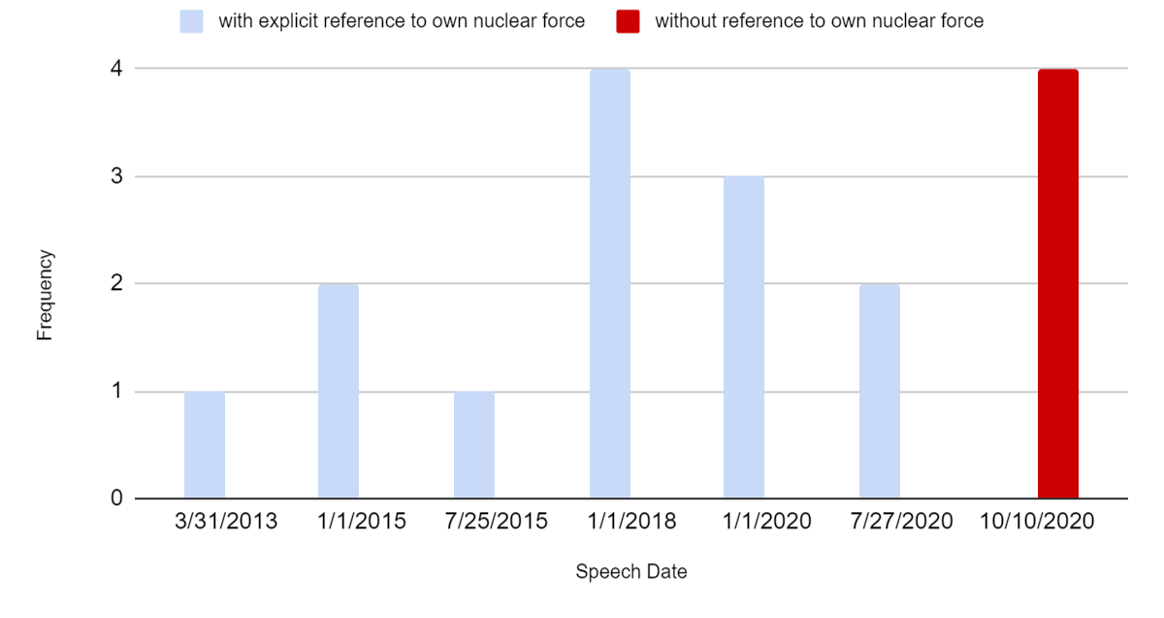
Figure 8. Frequency of references to "deterrence" in Kim Jong Un's speeches. Source: KCNA, Foreign Languages Publishing House
However, looking at the precise language used in the speech, and taking into account that the military parade featured a number of strategic weapons, including a new intercontinental ballistic missile (ICBM) and what is believed to be a new submarine-launched ballistic missile (SLBM) called Pukguksong-4, this observation has to be cautiously assessed. It is evident that he refers to the country's nuclear deterrent when saying that "our war deterrent, which is intended to defend the rights to independence and existence of our state and safeguard peace in the region, will never be abused or used as a means for preemptive strike. But, if, and if, any forces infringe upon the security of our state and attempt to have recourse to military force against us, I will enlist all our most powerful offensive strength in advance to punish them." [12]
One interpretation is that the country's deterrent force has reached the point where it is no longer deemed necessary to explicitly refer to it by name and to simply allow a highly staged and choreographed parade to showcase the state of the nuclear deterrent. The country has arguably been sufficiently explicit about the role of nuclear weapons in its thinking on deterrence and the notion of a qualified no preemptive use is similarly not new. [13] Overall, this speech reflects known public messaging on military and nuclear policy, while showing some restraint on being explicit about the country's developing nuclear force.
[1] Kim Jong Un Makes Speech at Military Parade and Public Procession of Pyongyang Citizens, KCNA, 11 October 2015
[2] Military Parade Marks Founding Anniversary of WPK, KCNA, 10 October 2020
[3] Oh Seok-min, N. Korea appears to have staged massive military parade at dawn: S. Korean military, Yonhap News Agency, 10 October 2020, available at: https://en.yna.co.kr/view/AEN20201010002153325
[4] Military Parade Marks Founding Anniversary of WPK, KCNA, 10 October 2020
[5] Kim Tok Hun and Ri Pyong Chol were elected as members of the Presidium of the Central Committee's Political Bureau with the former also being promoted to Cabinet Premier. Pak Myong Sun and Jon Kwang Ho were elected as alternate members of the Political Bureau;Kim Jae Ryong and Pak Thae Dok were elected as Vice-Chairmen of the Central Committee. 16th Meeting of Political Bureau of 7th Central Committee of WPK Held, KCNA, 14 August 2020
[6] 19th Meeting of Political Bureau of 7th Central Committee of WPK Held, KCNA, 6 October 2020
[7] The utilized TextBlob library provides a sentiment/polarity score in the range of [-1.0, 1.0] and a subjectivity score in the range of [0.0, 1.0]. Tutorial: Quickstart, TextBlob, available at: https://textblob.readthedocs.io/en/dev/quickstart.html#sentiment-analysis
[8] Supreme Leader Kim Jong Un Delivers Speech at Military Parade, KCNA, 10 October 2020
[9] Original: "남녘 동포들의 소중한 건강이 지켜지기를 빌겠습니다." See: 김정은 북한 국무위원장 친서 관련 윤도한 국민소통수석 브리핑 [Briefing by Senior Presidential Secretary for Public Communication Yoon Do Han on a Personal Letter by North Korean Chairman Kim Jong Un], Cheong Wa Dae, 5 March 2020, available at: https://www1.president.go.kr/articles/8228
[10] Original: "나는 대통령께서 지니고있는 국가와 자기 인민에 대한 남다른 정성과 강인한 의지와 능력이라면 반드시 이 위기를 이겨내실것이라고 마음속으로 굳게 믿습니다 (...) 그리고 다시한번 남녘동포들의 소중한 건강과 행복이 제발 지켜지기를 간절히 빌겠습니다." See: 남북 정상 친서 관련 서훈 국가안보실장 브리핑 [Briefing by National Security Office Director Suh Hoon on Personal Letters between South-North Leaders], Cheong Wa Dae, 25 September 2020, available at: https://www1.president.go.kr/articles/9239
[11] Kim Yo Jong Rebukes S.Korean Authorities for Conniving at Anti-DPRK Hostile Act of Defectors from North, KCNA, 4 June 2020
[12] Supreme Leader Kim Jong Un Delivers Speech at Military Parade, KCNA, 10 October 2020
[13] For example, see: "As a responsible, peace-loving nuclear power, our country will neither have recourse to nuclear weapons unless hostile forces of aggression violate its sovereignty and interests nor threaten any other country or region by means of nuclear weapons. However, it will resolutely respond to acts of wrecking peace and security on the Korean peninsula." See: Kim Jong Un Makes New Year Address, KCNA, 1 January 2018; "From this moment [in response to ROK-US Operation Plan 5015] all the powerful strategic and tactical strike means of our revolutionary armed forces will go into pre-emptive and just operation to beat back the enemy forces to the last man if there is a slight sign of their special operation forces and equipment moving to carry out the so-called "beheading operation" and "high-density strike", See: Ja Song Nam, Letter dated 24 February 2016 from the Permanent Representative of the Democratic People's Republic of Korea to the United Nations addressed to the Secretary-General. 24 February 2016, available at: https://undocs.org/pdf?symbol=en/A/70/760